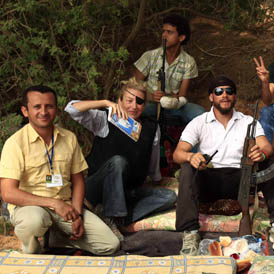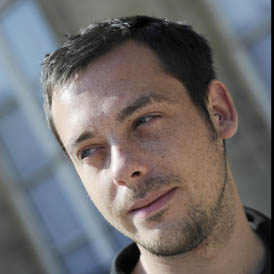Tributes pour in for veteran war reporter Marie Colvin
Words of praise flood in from across the world for veteran Sunday Times journalist Marie Colvin after she was killed in a shell attack in the Syrian city of Homs.

Her editor, John Witherow, spoke of the death in a note to staff which also confirmed that British freelance photographer, Paul Conroy, had been wounded.
Describing her as “an extraordinary figure in the life of The Sunday Times”, he told how “nothing seemed to deter her.” He added: “But she was much more than a war reporter. She was a woman with a tremendous joie de vivre, full of humour and mischief and surrounded by a large circle of friends, all of whom feared the consequences of her bravery.”
Ms Colvin was killed in the district of Baba Amr alongside award-winning French photojournalist, Remi Ochlik, after the house they were in came under bombardment this morning.
“Often terrier-like, she would remain on a story well after others had sensibly moved to safer places.” General Sir David Richards, chief of the defence staff
As they tried to escape the building, they were hit by a rocket and killed.
Victims of violence
Three or four other journalists were reportedly injured in the attack. One of these is believed to be Edith Bouvier, a reporter with the French daily, Le Figaro.
Mr Witherow said: “Marie was…driven by a passion to cover wars in the belief that what she did mattered.
“She believed profoundly that reporting could curtail the excesses of brutal regimes and make the international community take notice.
“Above all, as we saw in her powerful report last weekend, her thoughts were with the victims of violence.”
New International chief, Rupert Murdoch, added that his thoughts were “with her family”.
US-born Ms Colvin was recruited to The Sunday Times more than 25 years ago by David Blundy, her predecessor as Middle East correspondent. He was himself killed in El Salvador in 1989.
She was known for the humanity of her reports from frontlines across the world, along with her determination, which saw her file a 3,000 word story the same weekend that she lost her eye in an attack in Sri Lanka.
Huge loss
Words of praise were also expressed by personal friends, including General Sir David Richards, chief of the defence staff. He told Channel 4 News from Canada: “She was the bravest and the best of war correspondents. Determined to discover the truth, yet responsible and balanced in her reporting, huge fun yet very serious about her job.
“Often terrier-like, she would remain on a story well after others had sensibly moved to safer places. She’s a huge loss to us all.”
At prime ministers’ questions, David Cameron joined the tributes, describing Ms Colvin as “talented and respected”. Labour leader Ed Miliband said “the journalistic community have lost one of their finest and their most fearless.”
In a statement, Foreign Secretary William Hague paid tribute to the bravery of Mr Ochlik as well as Ms Colvin.
“If journalists were not there, the massacres would be a lot worse.” President Nicolas Sarkozy
He added that Ms Colvin “was utterly dedicated to her work, admired by all of us who encoutered her, and respected and revered by her peers. Marie and Remi died bringing us the truth about what is happening to the people of Homs.”

Assassination?
French President Nicolas Sarkozy described the deaths of the two journalists as an “assassination”.
“That’s enough now,” he said. “This regime must go and there is no reason that Syrians don’t have the right to live their lives and choose their destiny freely. If journalists were not there, the massacres would be a lot worse.”
Syrian National Council spokeswoman Basma Kodmani laid the blame for the attacks at President Assad’s door. “Homs has become an extremely dangerous place. I don’t see any reason for the opposition or revolutionary forces to shoot at journalists. It’s most probably people related to the regime,” she said.
Mr Ochlik, 29, was awarded with a World Press Award for his work in Libya just two weeks ago. His death follows that of Gilles Jacquier, of French TV station, France 2, who was killed in January while on a visit to Homs organised by the Syrian government.